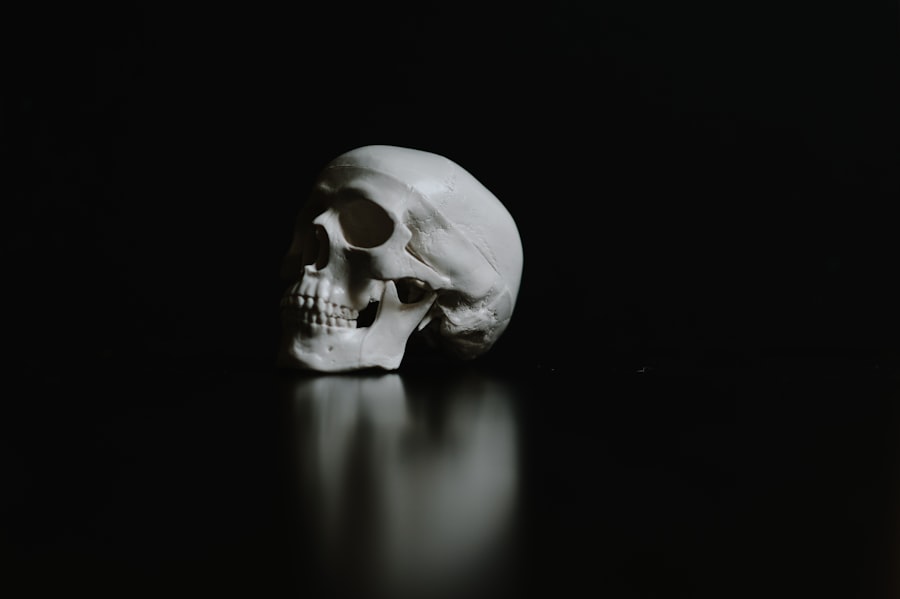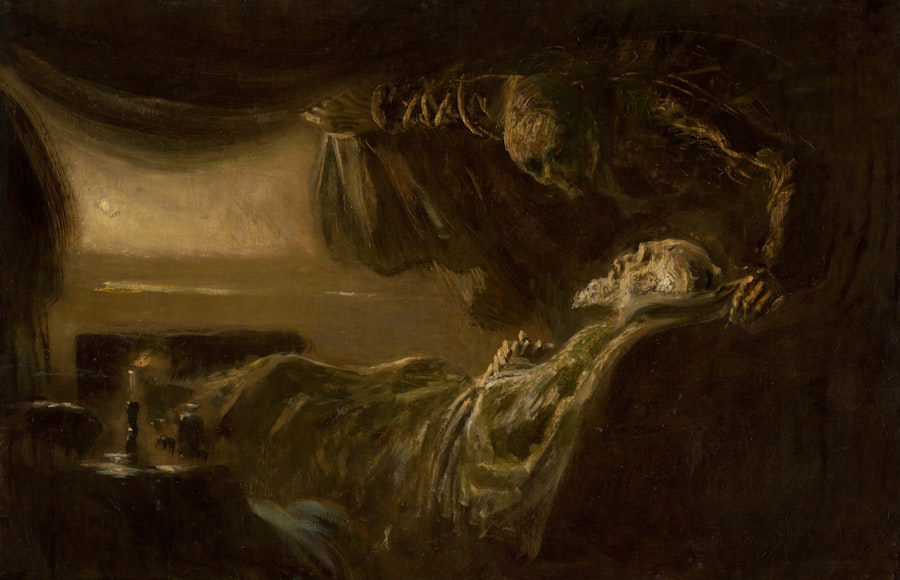The concept of consciousness after death has intrigued humanity for centuries, weaving its way through philosophical discourse, religious beliefs, and scientific inquiry. You may find yourself pondering the nature of existence and what lies beyond the veil of life. This exploration is not merely an academic exercise; it touches on the very essence of what it means to be human.
As you delve into this topic, you will encounter a myriad of perspectives that challenge your understanding of life, death, and the possibility of an existence beyond the physical realm. In many cultures, the idea of an afterlife is deeply embedded in spiritual beliefs. You might consider how various religions interpret consciousness after death, from the reincarnation cycles in Hinduism to the eternal paradise promised in Christianity.
These narratives provide comfort and hope, suggesting that consciousness transcends the physical body. However, as you navigate through these beliefs, you may also encounter scientific perspectives that seek to demystify the phenomenon of consciousness itself, raising questions about whether it can exist independently of the brain.
Key Takeaways
- Near-death experiences provide intriguing insights into consciousness beyond clinical death.
- Scientific studies explore brain activity patterns during near-death states to understand consciousness.
- Quantum physics offers theoretical frameworks linking consciousness to phenomena after death.
- The role of DMT is investigated as a possible biochemical basis for near-death experiences.
- Ongoing debates and research aim to clarify the nature and existence of consciousness after death.
Near-Death Experiences and Consciousness
Near-death experiences (NDEs) have become a focal point in discussions about consciousness after death. You may have heard stories of individuals who, in moments of clinical death, report vivid experiences that often include feelings of peace, encounters with deceased loved ones, or even journeys through tunnels of light. These accounts are not just anecdotal; they have sparked significant interest in understanding what happens to consciousness when the body is on the brink of death.
As you explore NDEs, you might find that they often share common elements across different cultures and backgrounds. This universality raises intriguing questions about the nature of consciousness itself. Are these experiences merely hallucinations caused by a dying brain, or do they suggest a deeper reality?
The emotional and transformative impact of NDEs on those who experience them cannot be understated; many report a profound shift in their understanding of life and death, leading to a greater appreciation for existence.
Scientific Studies on Near-Death Experiences

Scientific inquiry into near-death experiences has gained momentum over the past few decades. Researchers have sought to understand the physiological and psychological mechanisms behind these phenomena. You may be interested to learn that studies have shown that NDEs can occur in a variety of medical situations, from cardiac arrest to traumatic injuries.
This has led scientists to investigate whether there is a consistent pattern to these experiences and what they might reveal about consciousness. One notable study involved patients who had experienced cardiac arrest and were later revived. Researchers found that some individuals reported detailed accounts of events that occurred while they were clinically dead.
This raises compelling questions about the nature of consciousness: if awareness can persist when brain activity is minimal or absent, what does this imply about the relationship between consciousness and the physical body? As you consider these findings, you may find yourself grappling with the implications for our understanding of life and death.
Brain Activity and Consciousness After Death
| Metric | Description | Typical Observations After Death | Reference Timeframe |
|---|---|---|---|
| EEG Activity | Electrical activity of the brain measured by electroencephalogram | Rapid decline to flatline; occasional brief surges of activity reported in some studies | Seconds to minutes post-cardiac arrest |
| Gamma Wave Bursts | High-frequency brain waves associated with consciousness and cognition | Transient increase observed in animal models shortly after cardiac arrest | Within 30 seconds post-cardiac arrest |
| Neuronal Firing Rate | Rate at which neurons generate action potentials | Sharp decrease followed by cessation; some neurons may fire briefly after death | Seconds to minutes after circulatory arrest |
| Brain Oxygen Levels | Oxygen saturation in brain tissue | Rapid depletion leading to hypoxia and loss of function | Within seconds after blood flow stops |
| Consciousness Indicators | Behavioral or physiological signs of awareness | Absent; some reports of near-death experiences but no verified consciousness | Minutes after clinical death |
The relationship between brain activity and consciousness is a complex and often debated topic. You might wonder how consciousness can exist if brain activity ceases at death. Recent studies have shown that even during moments of clinical death, there can be bursts of brain activity that suggest a heightened state of awareness.
This phenomenon challenges traditional notions of consciousness being solely tied to brain function. As you delve deeper into this subject, you may encounter theories suggesting that consciousness could be a fundamental aspect of the universe, rather than merely a byproduct of brain activity. This perspective posits that consciousness might exist independently of the physical body, allowing for the possibility of its continuation after death.
Such ideas invite you to reconsider your understanding of what it means to be conscious and how this state might transcend physical limitations.
Quantum Physics and Consciousness After Death
Quantum physics has introduced revolutionary ideas that challenge our conventional understanding of reality.
Theories such as quantum entanglement suggest that particles can remain interconnected across vast distances, leading some to speculate about the potential for consciousness to exist beyond the confines of the physical body.
As you explore these theories, you might consider how they intersect with concepts of consciousness after death. If consciousness is indeed a fundamental aspect of the universe, as some quantum theorists propose, then it raises profound questions about what happens to our individual consciousness when we die. Could it be that our awareness continues in some form, transcending time and space?
This line of inquiry invites you to ponder the mysteries of existence and the potential for a reality beyond what we can perceive.
The Role of DMT in Near-Death Experiences

DMT (dimethyltryptamine) is a powerful psychedelic compound that has garnered attention for its potential role in near-death experiences. You may be intrigued by research suggesting that DMT is naturally produced in the human brain, particularly during moments of extreme stress or trauma, such as near-death situations. Some theorists propose that this release could explain the vivid and often transformative experiences reported by those who have had NDEs.
As you consider the implications of DMT in relation to consciousness after death, you might reflect on how this substance alters perception and induces profound states of awareness. The experiences reported by individuals under the influence of DMT often mirror those described in NDEs—feelings of unity, encounters with otherworldly beings, and a sense of timelessness. This raises questions about whether DMT could serve as a bridge between our physical existence and a potential afterlife, suggesting that consciousness may have dimensions yet to be fully understood.
Consciousness and the Afterlife
The exploration of consciousness inevitably leads to questions about the afterlife. You may find yourself contemplating what it means for consciousness to persist beyond physical death. Various philosophical and spiritual traditions offer differing views on this topic, from reincarnation to eternal existence in a spiritual realm.
Each perspective provides unique insights into the nature of consciousness and its potential continuity after death. As you engage with these ideas, consider how they resonate with your own beliefs and experiences. The notion that consciousness could continue in some form after death offers both comfort and intrigue.
It invites you to reflect on your own life choices and relationships, emphasizing the importance of living meaningfully in the present moment while contemplating what may lie beyond.
The Debate on Consciousness After Death
The debate surrounding consciousness after death is vibrant and multifaceted, encompassing perspectives from philosophy, science, and spirituality. You may find yourself drawn into discussions about whether consciousness is an emergent property of complex biological systems or if it exists as a fundamental aspect of reality. This ongoing dialogue reflects humanity’s deep-seated desire to understand our place in the universe and what happens when we die.
As you navigate this debate, consider how differing viewpoints shape our understanding of life and death. Some argue that scientific evidence supports a materialistic view where consciousness ceases with brain activity, while others advocate for a more expansive understanding that allows for continuity beyond physical existence. Engaging with these contrasting perspectives can deepen your appreciation for the complexity of consciousness and its potential implications for our understanding of reality.
Theories on the Nature of Consciousness After Death
Numerous theories have emerged regarding the nature of consciousness after death, each offering unique insights into this enigmatic subject. You might explore dualistic theories that posit a separation between mind and body, suggesting that consciousness can exist independently after physical death.
As you delve into these theories, consider how they align with your own beliefs and experiences. The exploration of consciousness after death invites you to reflect on your understanding of existence itself—what it means to be conscious and how this state might transcend our physical limitations. Engaging with these theories can provide valuable insights into your own journey toward understanding life’s most profound mysteries.
Implications of Scientific Proof of Consciousness After Death
Should scientific proof emerge supporting the idea of consciousness after death, the implications would be profound and far-reaching. You may envision how such evidence could reshape societal views on mortality, ethics, and spirituality. It could challenge long-held beliefs about life’s finality and inspire new approaches to end-of-life care, grief processing, and even legal considerations surrounding death.
As you contemplate these potential changes, consider how they might influence your own perspective on life and death. The possibility that consciousness continues beyond physical existence could foster greater compassion for others’ experiences with loss while encouraging deeper connections with loved ones during your lifetime. Such revelations could inspire a collective shift toward valuing life’s fleeting moments while embracing the mysteries that lie beyond.
Conclusion and Future Research on Consciousness After Death
In conclusion, the exploration of consciousness after death remains one of humanity’s most profound inquiries. As you reflect on the various perspectives presented—from near-death experiences to scientific studies—you may find yourself grappling with more questions than answers. Yet this journey is essential for deepening your understanding of existence itself.
Future research holds promise for unraveling some of these mysteries surrounding consciousness after death. As scientific methods advance and interdisciplinary collaboration flourishes, new insights may emerge that challenge existing paradigms while expanding our comprehension of life’s ultimate questions. Engaging with this ongoing dialogue invites you to remain open-minded as you navigate your own beliefs about consciousness and what lies beyond this life—a journey that is as much about discovery as it is about introspection.
Recent discussions surrounding the scientific proof of consciousness after death have gained traction, particularly in light of various studies and articles exploring this intriguing topic. One such article that delves into the nuances of consciousness and its potential persistence beyond physical existence can be found at Freaky Science. This resource provides insights into the ongoing research and theories that challenge our understanding of life and consciousness, making it a compelling read for those interested in the intersection of science and spirituality.
WATCH THIS! Your Brain Is Not Real (The Receiver Theory)
FAQs
What is meant by “consciousness after death”?
Consciousness after death refers to the idea that an individual’s awareness, thoughts, or sense of self continues to exist in some form after the physical body has died.
Is there scientific proof that consciousness survives after death?
As of now, there is no conclusive scientific proof that consciousness survives after death. While some studies explore near-death experiences and related phenomena, these do not definitively demonstrate consciousness continuing beyond physical death.
What types of studies investigate consciousness after death?
Research often includes studies on near-death experiences (NDEs), out-of-body experiences, and reports from cardiac arrest survivors. Some experiments also explore the possibility of consciousness existing independently of brain activity, but these remain inconclusive.
How do scientists measure consciousness?
Consciousness is typically assessed through brain activity using tools like EEG (electroencephalogram) and fMRI (functional magnetic resonance imaging). However, measuring consciousness after death is challenging because brain activity ceases when the body dies.
Are near-death experiences considered evidence of consciousness after death?
Near-death experiences are intriguing and widely reported, but they are not considered definitive evidence of consciousness after death. Many scientists interpret NDEs as brain-based phenomena occurring during critical medical conditions.
What challenges exist in proving consciousness after death scientifically?
Challenges include the inability to measure consciousness without brain activity, the subjective nature of experiences reported, and the lack of reproducible, empirical data supporting consciousness beyond death.
Have any experiments attempted to test consciousness after death?
Some experiments have attempted to detect awareness during clinical death or measure responses during cardiac arrest, but none have provided conclusive evidence that consciousness persists after death.
What is the scientific consensus on consciousness after death?
The scientific consensus is that consciousness is closely linked to brain function and that there is no verified evidence supporting its continuation after death. Research continues, but claims of consciousness after death remain unproven.
Can quantum physics explain consciousness after death?
Some theories propose quantum mechanics might play a role in consciousness, but these ideas are speculative and not widely accepted as evidence for consciousness after death within the scientific community.
Where can I find reliable information about consciousness and death?
Reliable information can be found in peer-reviewed scientific journals, books by neuroscientists and psychologists, and reputable organizations specializing in consciousness research and medical science.
